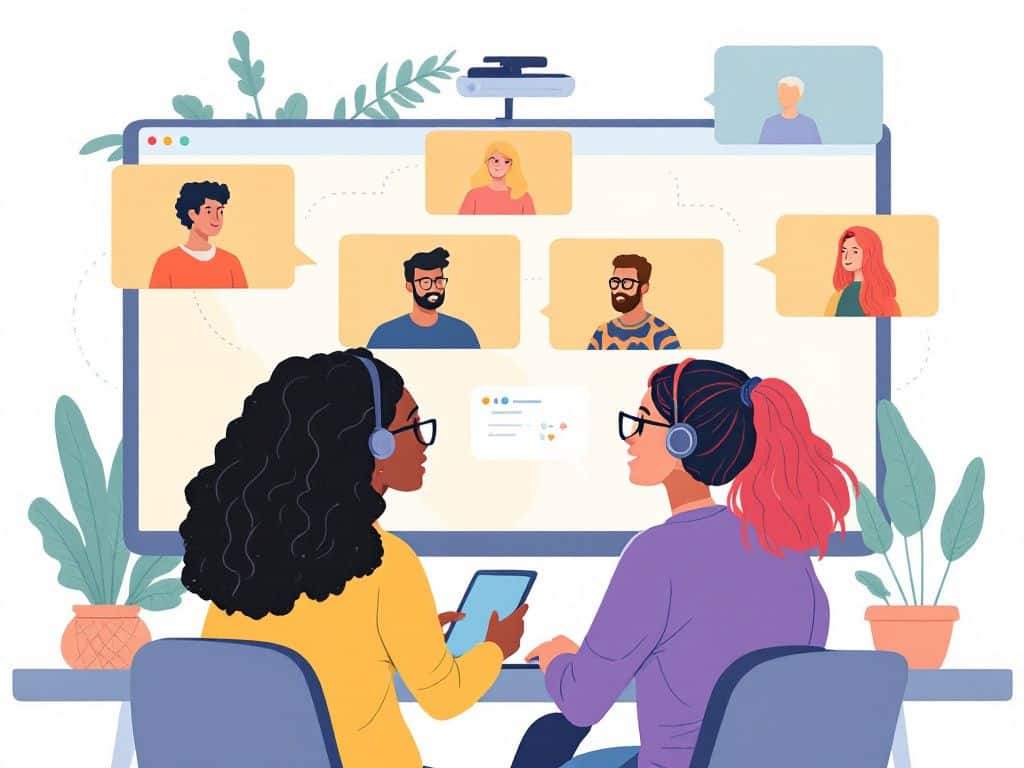Hey there! So, you’re diving into the world of virtual focus groups, right? Or maybe you’re trying to figure out if they’re even worth your time. Either way, you’re in the right spot. Creating a space where ideas flow freely – even through a computer screen – is kind of an art form. Whether you’re new to this or looking to refresh your strategy, let’s chat about how to make your virtual focus group not just effective, but enjoyable.
Why Virtual Focus Groups Are Your New Best Friend
Okay, let’s set the scene: you’re tasked with gathering insights that could shape the next big thing for your business. Traditional focus groups? Sure, they’ve always been a reliable go-to. But virtual ones? They’ve got some serious advantages that are hard to ignore.
**First Off, It’s Convenient as Heck.** You’re not asking folks to commute somewhere on a Tuesday evening. They just have to log in — and boom, they’re in. You get participants from all over, widening your pool, and no one’s got travel on their mind.
**Second, Say Hello to Cost Savings.** No room to rent, no travel expenses, no mounds of catering. Your budget gets a breather, which means you can probably hold more sessions or maybe even up the pay for participants. Everyone wins.
**Lastly, There’s Something Special About A Screen.** Without face-to-face pressure, people might open up in ways they wouldn’t otherwise. It feels a bit safer, more anonymous, and that can lead to deeper insights.
Step Into the Shoes of Your Participants
Okay, so you’re sold on the idea, now what? One of the key aspects of virtual focus groups is understanding the participant’s perspective. Getting this right can make all the difference between a flat conversation and electric revelation.
The Prep: Event Preparation Is Key
Think about when you’ve been part of an online meeting that just clicked. Nine times out of ten, it’s because it was planned out and thoughtfully prepared – and the same goes for focus groups.
- Set It Clear from the Get-Go. Everyone loves a good game plan. Be transparent about what your participants can expect. Clear instructions about what they need, including tech requirements, can smooth out the initial bumps.
- Get Tech-Savvy. Familiarize yourself with the virtual platform you’ll be using. No one wants to be stuck in mute or video issues. Stress-test things, and have a plan for tech fails. Spoiler: they will happen.
- Foster a Welcoming Atmosphere. Send a friendly email ahead of time, something along the lines of, “Hey, so glad you’re joining. Here’s what’s the agenda. And, also, here’s your favorite emoji, just because!” Engage early – it sets the tone.
The First Meetings: Make It Feel Real

Jumping in, you’ve got to set the context right. In the virtual world, human connection still trumps the digital divide.
**Warm up right.** Ever noticed how real-world focus groups start with a bit of chit-chat? You should definitely do this online too. Even a simple, “Hey, what’s everyone sipping on today?” can break the ice.
**Keep it Personal, Make it Fun.** Use names, laugh a bit, and ask questions that personalize the experience. It’s important to strike a friendly tone, making your participants feel truly seen will increase engagement tenfold.
Tools and Tech: Choose Wisely
With loads of tools out there, figuring out what tech to use during your research event preparation can be a maze. Here’s how to navigate it.
Platforms: Take Your Pick
There are a few main players in the virtual space, each with its own perks:
- Zoom: The go-to for video conferencing. Reliable, user-friendly, and familiar to most folks.
- Microsoft Teams: Great if you’re already tied into the Office ecosystem.
- Google Meet: Simple with no fuss, perfect for those with a Google account.
- BlueJeans: Offers high-quality video and sound, a less obvious choice but worth considering if these features matter most.
No matter the platform, ensure you’re well-versed in its capabilities around polls, breakouts, and other engagement features. Those are your secret weapons!
Accessibiza: Low Barriers to Entry
A vital part of event preparation for any virtual focus group – ensure all participants can engage easily. This means considering accessibility in your platform and approach:
- Are there language needs? Think bilingual tools or subtitles.
- What about participants with disabilities? Check if the platform supports screen readers or closed captioning.
- Privacy and security should be another focal consideration, especially when handling sensitive data.
Crafting Questions: That Sweet Spot

Getting the questions just right? That takes some finesse. Let’s break it down.
**Go Broad, Then Narrow.** You want to open with broad, open-ended questions that set the stage for discussion. As you get deeper, funnel your questions to focus on specifics.
**Avoid Jargon and Over-Complexity.** Plain language is key. Honest storytelling is often what you’re after, so keep questions relatable.
Examples:
- For a broad start: “What’s the role of digital tools in your daily life?”
- Gradually moving in: “How did our app enhance or challenge your daily tasks compared to others?”
Wandering off subject is bound to happen. Embrace it—it often leads to the insights you wouldn’t have uncovered otherwise. Circle back where needed but respect the flow.
Facilitation Skills: Be the Engaging Ringmaster
Facilitating a virtual focus group is not without its challenges. Maintaining energy levels, reading a ‘virtual room’, and keeping discussions on track all require a fine balance.
Energize and Engage
**Read the digital room.** Look out for non-verbal cues. Even on screen, faces can tell when folks are disinterested or frustrated. Don’t be afraid to take breaks, shift questions, or vary the tempo.
**Engage all voices.** This can be harder online, but with deliberate techniques like round-robin questioning or digital hand-raising, you can ensure even participation.
**Flexibility is the Name of the Game.** Conversations are unpredictable, so skillfully adapting when new talking points or dominating voices require intervention is crucial for capturing holistic insights.
Reviewing Results: Turning Talk into Action
Once the session ends, the real work begins. Transform the conversation into actionable insights.

Analyze and Synthesize
- Transcribe Thoughtfully. Consider tools that can transcribe your sessions for you, letting you focus on the content itself rather than manual documentation.
- Look for Patterns. Identify recurring themes, phrases, or sentiments. These patterns can form the basis of product tweaks, new feature ideas, or marketing messages.
- Prioritize Insights. Not all feedback will carry the same weight. Prioritize based on alignment with business goals or feasibility.
Deliver Conclusions
Format your results into a clear, engaging presentation. Use visual aids like graphs or storyboards to breathe life into your data. Remember, the aim is to create a narrative that makes the findings not just understandable, but unforgettable.
Common Pitfalls: What to Watch Out For
As seamless as we hope these virtual events to be, they’re sometimes fraught with their own pitfalls.
- Overcrowding the Session. Too many cooks can spoil the broth. Smaller, targeted groups often yield more detailed, accurate insights.
- Ignoring the Environment. Sound matters. Pick up good quality microphones and check everyone’s connection subtly but effectively. Trust me, nothing breaks flow quite like technical hiccups.
- Neglecting the Follow-Up. Even after you’ve mined the gold, nurture those participant relationships. Thank them and keep them in the loop; they might be valuable again!
Closing Thoughts and Synergy Between Virtual Groups and Future Preparation
There you go! By embracing the virtual focus group and giving the event preparation its due diligence, you’re setting yourself up for orbiting success in research. Balancing engagement with efficiency in a world brimming with digital potential? That’s the magic.
Wondering if these virtual gatherings carry the same weight in decision-making as in-person meetings? Well, they absolutely do. Virtual focus groups aren’t just a pandemic workaround; they’re part of our enduring work and research evolution.
So go on, give it a try—your future-focused arsenal if wielded right, can lead to golden nuggets of insight. Embrace the flexibility, relish the broadened reach, and above all, keep the conversation human. Happy focusing, virtually!
Frequently Asked Questions
What are the key stages involved in event preparation?
The key stages involved in event preparation include Research, Design, Planning, Coordination, Evaluation, Implementation, and Follow-up. These stages guide event planners through the lifecycle of an event, from the initial concept to post-event analysis, ensuring a structured approach to creating successful and memorable events[1].
How do I ensure thorough planning for an event?
To ensure thorough planning, use the 5W1H method, which stands for Who, What, When, Where, Why, and How. This method ensures that all critical questions are addressed during the planning process. Additionally, consider the 3 C’s of event management: Concept, Coordination, and Control, to ensure the event is well-planned, executed effectively, and aligned with the intended goals[1].
What are some essential tasks to complete during pre-event preparation for a virtual event?
For a virtual event, essential tasks include creating a sample Interactive Webinar and cloning it to avoid starting from scratch, ensuring at least 30 minutes of prep time before the start of the webinar, assigning roles to team members, and setting up a registration form and landing page. Also, promote the event through emails, social media, and paid advertising, and send reminder emails to registered attendees[2].
Why is it important to have an event FAQ for attendees?
An event FAQ is crucial as it provides a convenient way for attendees to find solutions to common problems without needing to contact the event team. It also saves the event team time by addressing common questions in advance. The FAQ should be easily accessible on the event website, email blasts, and the event app[3].
References










